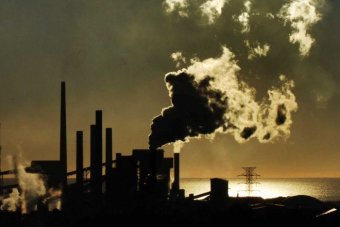Climate change: Scientists sad, frustrated as extreme weather becomes the new norm
Updated
Call it fatigue, call it frustration, but some of the best brains in the country are fed up.
Australia's leading climate scientists joined their New Zealand counterparts in Canberra for a four-day conference last week, but dark clouds lingered over their discussions.
The theme of the conference was "Australasian weather, climate and oceans: past, present and future".
And global warming was never far from the guests' lips.
"There is definitely what you would call 'climate fatigue' on the part of scientists," said Dr Andrew Glikson, from the Australian National University's School of Archaeology and Anthropology.
"There were hundreds of scientists there, and my impression is while we continue to do the science as best we can, there is a fatigue when it comes to arguing in public.
"It's definitely a concern. There are people who don't think in scientific terms and don't want to accept the basic laws of nature, or have some vested interest.
"You can explain to them as long as you like but if they don't wish to understand, they won't."
Dr Glikson is one of Australia's leading voices on climate change and last year penned an open letter to Prime Minister Malcolm Turnbull, signed by more than 150 scientists, demanding more action be taken to ease greenhouse gas emissions.
Science behind scorching heat
The conference's final sessions on Friday were conducted in scorching 41 degree Celsius temperatures — the prelude to a weekend of extreme weather events in Australia.
All-time records were set over the weekend in several locations.
| Town | Temperature | Day |
|---|---|---|
| Williamtown | 45.5C | Saturday |
| Dubbo | 46.1C | Saturday |
| West Wyalong | 46.3C | Saturday |
| Bathurst | 41.5C | Saturday |
| Scone | 46.5C | Sunday |
| Port Macquarie | 46.5C | Sunday |
| Moree | 47.3C | Sunday |
| Gunnedah | 45.6C | Sunday |
The weather made for "catastrophic" bushfire conditions, and on Sunday emergency warnings were issued for five blazes in NSW where more than 30 homes were destroyed.
Karl Braganza, the Bureau of Meteorology's head of climate monitoring, said searing temperatures were the new norm.
He did not attend the conference.
"What we're seeing more often is that it's not just a heatwave, it's a record-breaking heatwave," Dr Braganza said.
"Next year you might get conditions for an average summer, but when the conditions are favouring a hot spring or a hot summer, we're seeing temperature records.
"I think that's a trend that we're going to have to get used to.
"Clearly that has an impact on the landscape and the way fires can take hold and spread."
In Western Australia it was a different, much damper story with widespread flooding last week. So far, two people have died.
The state's south west is in the midst of its wettest February since 1955, and the second wettest from records back to 1900.
'It just hits you what we're doing to our planet'
Dr Glikson was not the only person to leave Canberra with a heavy heart.
Professor Will Steffen, a climate scientist from the ANU, gave the last talk of the conference, and spoke of the Anthropocene — the concept of a new geological era dominated by the influence of humans.
 Photo:
The bush fire burning to the east of Dunedoo, north of the Golden Highway, has burnt through more than 40,000 hectares. (ABC News: Jessica Kidd)
Photo:
The bush fire burning to the east of Dunedoo, north of the Golden Highway, has burnt through more than 40,000 hectares. (ABC News: Jessica Kidd)
Dr Ben Henley, a research fellow at the University of Melbourne, was in the audience.
"I remember him putting up a slide of planet Earth, and he just said 'yes, we are in the Anthropocene'," he said.
"We are moving into this era when humans are the major force on the planet.
"That is being formalised in scientific literature and that really affected me, just seeing this eminent scientist standing there at the end of this conference when we've been talking for five days about models and data and climate mechanisms and so on.
"Then there's this eminent scientist with a very simple message. It makes you wonder. It's a sad fact.
"We study the mechanisms and the data and remove our personal feelings as much as possible but then every now and then it just hits you that this is what we're actually doing to our planet."
Topics: climate-change, environmental-impact, environmental-policy, weather, australia, nsw, wa, qld, tas
First posted









